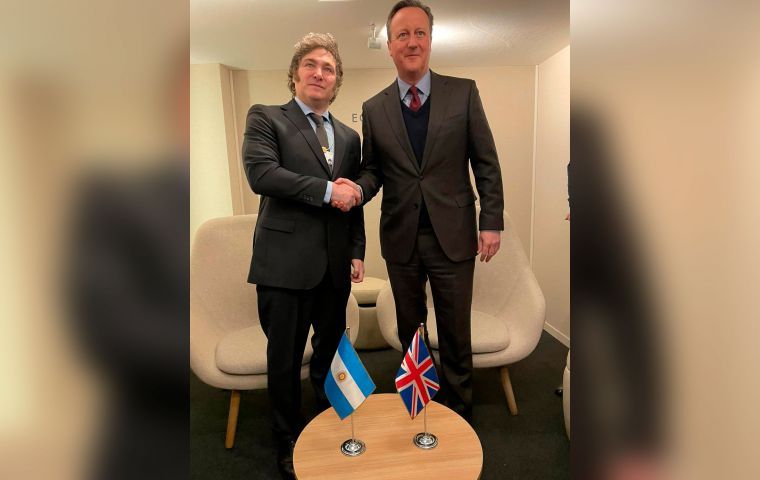MercoPress. South Atlantic News Agency
Will Javier Milei Upend Argentina’s Foreign Policy?
 President Javier Milei with Foreign Secretary David Cameron at Davos
President Javier Milei with Foreign Secretary David Cameron at Davos By Thiago de Aragao (*) Mere weeks after taking office, Argentine President Javier Milei has already picked fights with the United Kingdom and China, demonstrating his “anarcho-capitalist” approach to foreign policy. The complex reality of international diplomacy and economic interdependence requires a far more pragmatic stance.
SÃO PAULO – It hasn’t taken long for Argentina’s newly installed president, Javier Milei, to demonstrate the lunacy of a radical libertarian approach to foreign policy. At this year’s World Economic Forum meeting in Davos, Milei raised from the dead the issue of the Falkland Islands' sovereignty with UK Foreign Minister David Cameron, who promptly swatted away any discussion about the Islands’ future. At a time when Milei needs to revive Argentina’s moribund economy, evoking the Argentine military junta that launched the Falklands War in 1982 seems unhinged.
More ominously still, Milei has picked a fight with China, one of the country’s main trading partners. In late December, a lawmaker from Milei’s party met with representatives of Taiwan’s trade office in Argentina. Soon after, local media outlets reported a meeting between Argentine Foreign Minister Diana Mondino and Miao-hung Hsie, Taiwan’s representative in Buenos Aires.
This show of support for Taiwan suggests that Milei may hold true to his campaign promise to sever ties with China. His harsh criticism of “communist countries” in the run-up to the presidential election raised serious concerns about the future of Sino-Argentine relations, especially because Argentina relies heavily on a currency-swap agreement with China to finance imports and pay off debt maturities. Soon after Milei was sworn in as president, China reportedly suspended this agreement, hindering Argentina’s ability to meet its financial obligations.
Milei’s decision to scrap Argentina's planned entry into the BRICS (Brazil, Russia, India, China, and South Africa) grouping could also have significant economic implications, not least because it eliminates the possibility of securing funding from the BRICS’ New Development Bank. To be sure, the United States and Japan may welcome Argentina’s rejection of the BRICS invitation, which could lead to the emergence of other financing options. But, given Western economies’ over-indebtedness, betting on this would be a mistake.
While Milei, who describes himself as an “anarcho-capitalist,” may seek closer ties with what he calls the “free world,” the complex reality of international diplomacy and economic interdependence requires a more pragmatic and less ideological approach to managing Argentina’s foreign policy. In fact, over the last three weeks, Milei has started to recognize that as president of an emerging economy in crisis, two factors could push him toward political failure: Argentina’s legislature and China.
Earlier this month, Milei moved away from some of his more radical proposals after confronting the challenge of dealing with a Congress in which he does not have a majority. Compromise is required for any political negotiation, and the art of knowing how to give in is critical to success. In Milei’s case, he will need the courage to surrender quite a bit without any guarantee that he will get what he wants in return.
As for relations with China, Milei is fortunate to have the brilliant Mondino as his foreign minister. In an apparent effort to ease tensions, Mondino recently met with the Chinese ambassador to Argentina, Wang Wei, while the Foreign Ministry has insisted that her reported meeting with Taiwan’s representative was a misinterpretation by the press. Mondino also reaffirmed Argentina’s recognition of the “One China” principle, which is essential for maintaining a good diplomatic and trade relationship with China. The Milei administration’s softening stance reflects its recognition that Argentina’s financial ties to China rule out breaking off relations.
The Argentine government’s approach to China in the coming months will shape the future of the bilateral relationship, with significant implications for Argentina’s foreign policy, international standing, and economic stability. Typically, a period of heightened tensions with China can be defused by mild praise, as happened with former Brazilian President Jair Bolsonaro.
How the unfolding diplomatic drama between Argentina, China, and Taiwan plays out will reflect a complex array of geopolitical, economic, and strategic considerations. Argentina, a country with no money and runaway inflation, is in a hurry to mend ties. But China can afford to wait: it knows that Argentina will eventually need access to credit, and that other markets will be unwilling to provide it. In this context, the decisions made by Milei’s administration will not only influence Argentina’s bilateral relations with these countries, but also define its international position more broadly.
For its part, Taiwan is keenly aware that this rare opportunity for rapprochement could strengthen its position in South America; currently, its only diplomatic ally on the continent is Paraguay. Even if Argentina does not change its diplomatic recognition from China to Taiwan, establishing frequent communication with Milei’s administration is enough to put Taiwan back on the South American diplomatic chessboard. But Argentina must decide whether bolstering ties with Taiwan is worth an increasingly aggressive response from China. (Project Syndicate).
(*) Thiago de Aragão, CEO of Arko International – Latin American Research and Public Affairs, is a senior research associate at the Center for Strategic and International Studies.





Top Comments
Disclaimer & comment rules-

Read all commentsMilei brings a whole new meaning to the phrase “a bull in a china shop”. But the matter is interesting from two angles. First, it is a tangible example of the steps that China is taking to procure diplomatic support around the world. Of course a country is going to support anything China wants to do when China has that country by the short and curlies through a currency swap agreement. But the Chinese are learning that when a country is truly bankrupt, all creditors are the same. Either Argentina will find a way of continuing its existence without assistance from the Chinese, or Milei will have the humiliating experience of having to climb down. Either way the world is watching and hopefully those being romanced by the Chinese will in future look those Chinese gifts horses very carefully in the mouth.
Jan 27th, 2024 - 04:16 pm 0The second angle concerns Argentina itself. Economic necessity is a hard taskmaster. It is also an effective one. Politicians will go to extraordinary lengths to avoid taking hard decisions, and if you want your people really to understand economic necessity you have to put all alternatives firmly out of reach. Milei is trying to do this in part with the dollarization of the economy - if you can't just print more money to pay your bills, you are indeed coming face to face with necessity. Taking action to torpedo the Chinese swap arrangement may, intentionally or otherwise, have the same effect, bring the Argentines to understand that there is now nobody around who is prepared to save them from the consequences of their own decisions.
Commenting for this story is now closed.
If you have a Facebook account, become a fan and comment on our Facebook Page!